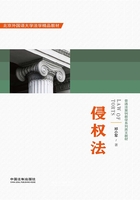
II.Definition of Tort Law (Selected)
Lecture on Cutting Edge issues of Civil and Commercial Law
Author: Wang Liming,
In [some] cases,it is difficult to follow the liability rules against the defendant,because he is not an actor,or a direct actor.So we cannot make him liable.But from the perspective of compensation,it shall be necessary to place liability upon him.
A typical case would be the injury by an object thrown from high above where there is no way to find the perpetrator.It happened all over the country several times,with all different results.For instance,in Chongqing,an ashtray was thrown to maim a pedestrian.In the end,the court assessed joint liabilities of all the residents of the building.
In these cases,if we stick to the rule that one must be responsible for one’s own behaviors,then indeed we need not find the actual perpetrator.Certainly,neither the property developer nor the property owners should be liable.But if we take it from the point of giving remedies to the unfortunate,I then believe that it is reasonable to place the burden of compensation on the property owners.That is to say,if we adopt the theory of loss sharing,without thinking either plaintiff’s or defendant’s fault,then we deal only with fair and reasonable distribution of the loss between the plaintiff and the defendant,by comparing both sides abilities to shoulder the loss,and let the party with stronger ability to shoulder the loss.From this perspective,it is only reasonable to let the property owners to take the loss,because they are more capable to pay than the victim.This is from the perspective of loss distribution,with emphasis on providing redress.This is a liability,but not from one’s own act;and from this point,it’s more appropriate to address the tort law as “Liability Law.”
Of all the personal injury cases by object from tall buildings,I personally favor the Chongqing case,except one minor point.It mentioned “fault,” which the property owners might be unwilling to take.What did the property owner do wrong? He’s liable simply because he was home that day? And he’d be liable even if he’s not home,away to work? Or simply because he purchased the wrong house? It seems too extraneous.In these cases,we should not consider fault,or it will be hard for the property owners to take.We consider only fairness,the fairness rule,not the fault,as basis for compensation.By this way,many property owners will take it.
Why the fairness basis for compensation? It is the nexus between defendant and plaintiff’s loss.For example,your house is located in a place where the accident took place.It might be wrong to say that this is your fault,but definitely,an object is thrown by someone from this building.We cannot find out who,but there must be some nexus.
I also believe that the property owner rule would be effective for preventing injuries,for when we ascertain liabilities to prevent future injuries,we ought to allocate the loss to those who are most closely connected with the cause of the injury.Whoever is closer to the cause should take the responsibility so that he would be prompted to take measures to prevent the injury from happening again.If we place the loss on someone not connected with the cause of the injuries,he would have no incentive to take preventative measures.
Our liability rule should also take into consideration of fairness liabilities.As I just mentioned,personal injury cases with an object from tall buildings are typical cases for fairness liabilities.Fairness liabilities means the court assessment,by taking into consideration of the parties’ degree of injury and economic conditions,on fairness basis,of reasonable compensation by the tortfeasor to the victim,when neither party is at fault for the injury,and no-fault liability rule does not apply.This is a liability arising on basis of wealth,mainly for redistribution of it in certain circumstance,which results even from no fault.